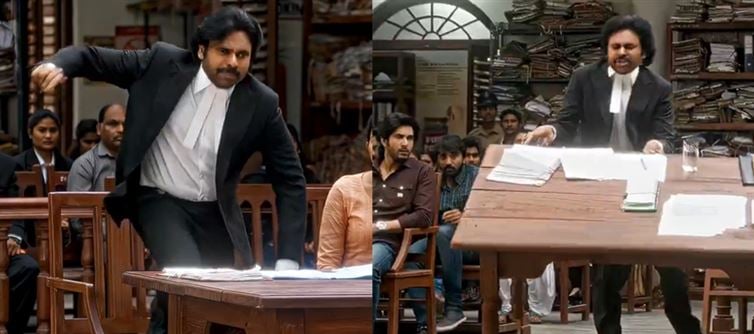
💣 WHEN LAW MET mass CINEMA
There are courtroom dramas. And then there’s Vakeel Saab — a film that tried to talk about consent but ended up sparking a consent crisis between art and mass fan service.
When Vakeel Saab released in 2021, it was billed as the telugu remake of Pink — a powerful, feminist hindi courtroom drama that dared to say what indian cinema had long avoided: “No means No.”
But when superstar Pawan Kalyan entered the frame — actor, politician, and messiah to millions — Pink’s subtle argument turned into a battle cry for fan validation.
And now, years later, that same film — or rather, that same performance — is back in headlines, becoming trolling fodder for an entire generation of meme-makers.
⚖️ THE ORIGINAL: PINK SPOKE TRUTH TO POWER
Let’s rewind.
The 2016 hindi film Pink, starring Amitabh Bachchan, wasn’t just a courtroom drama — it was a cultural moment.
It was quiet.
Measured.
Unflinchingly honest.
Bachchan’s lawyer wasn’t a hero — he was a vessel for truth. His strength came not from punchlines, but from pauses. Every word cut with precision, not volume.
It made people rethink the word “consent.” It didn’t shout — it educated.
🧨 THE REMAKE: VAKEEL SAAB TURNED JUSTICE INTO A JINGOISTIC SPECTACLE
Then came Vakeel Saab.
And with it, a megastar’s aura that demanded rebranding reality.
Instead of a film about women and agency, it became a Pawan Kalyan redemption vehicle.
The courtroom wasn’t a place for justice anymore — it was a stage for slo-mo struts, sermonizing, and sentiment.
The camera worshiped him more than it served the script.
What should have been a social conversation became a political audition — a hero speaking on behalf of women, rather than letting them speak for themselves.
In short, where Pink made women the story, Vakeel Saab made pawan kalyan the savior.
🩸 THE INTERNET’S VERDICT: “LUCKY HE’S KNOWN ONLY IN THE telugu STATES”
And the trolls didn’t hold back.
When a recent thread revisited Vakeel Saab’s courtroom monologues, the online reaction was brutal:
“If this film released in hindi, he’d be national meme material.”
“Amitabh spoke justice. Pawan delivered propaganda.”
“The courtroom scene looks like an election rally.”
The sarcasm was unrelenting, the memes unforgiving.
One viral comment summed it up perfectly:
“Amitabh would have a stroke after watching this bullshit.”
Behind the humor, though, lies a serious critique — the dilution of intent in remakes that chase applause instead of accountability.
🎭 politics IN A LAWYER’S COAT
What makes this trolling sting deeper is that Pawan Kalyan isn’t just an actor.
He’s a politician, the face of the Jana Sena Party, and a man whose off-screen persona constantly bleeds into his films.
When he plays a lawyer fighting for women’s rights, audiences can’t unsee the rallies, speeches, and soundbites.
His courtroom lines often echo his political rhetoric — grand, fiery, but suspiciously self-serving.
To his critics, Vakeel Saab wasn’t about defending victims — it was about defending his political image.
And when art becomes PR, the audience becomes the prosecutor.
💥 THE remake CURSE: WHEN YOU FOLLOW A LEGEND, YOU INVITE COMPARISONS
Remakes have always been risky.
When you follow Amitabh Bachchan — one of indian cinema’s most disciplined actors — you’re inviting microscopic scrutiny.
Every gesture, every pause, every glance gets measured against the original.
Where Bachchan’s silence spoke volumes, Pawan’s volume drowned out the silence.
It’s not that Vakeel Saab failed — it was a commercial hit.
But it failed at what Pink achieved: empathy.
Audiences came out whistling, not reflecting.
That’s not victory — that’s misinterpretation disguised as mass appeal.
🧠 THE BIGGER ISSUE: HOW SERIOUS cinema BECOMES mass PROPAGANDA
The trolling isn’t just about Pawan Kalyan — it’s about a pattern.
A larger cultural shift where films about social justice become ego trips for superstars.
It happened with Kabir Singh.
It happened with Simmba.
It happened with Vakeel Saab.
When cinema that should challenge patriarchy instead glorifies male saviors, it’s not entertainment — it’s indoctrination with background music.
The audience is no longer watching to learn — they’re watching to cheer.
And when you reduce a moral conversation to mass theatrics, you don’t raise awareness — you raise decibels.
🩵 THE IRONY: “NO MEANS NO” — UNLESS YOU’RE A STAR
The central line of Pink — “No means No” — became iconic because it was universal, non-political, and powerful.
In Vakeel Saab, it became a catchphrase for heroism, not humanity.
Pawan’s delivery turned empathy into applause.
The courtroom wasn’t a debate about women’s autonomy — it was a showdown for his stardom.
And the irony?
The same man delivering monologues about respect is often seen making political alliances that contradict those values.
The audience noticed. And the internet never forgets.
⚡ THE FINAL VERDICT: A CASE OF JUSTICE MISHANDLED
Here’s the thing: Vakeel Saab isn’t a bad movie — it’s a missed opportunity.
It had a message that mattered.
It had the material to make a difference.
But it chose mass over message — and in doing so, it became a meme.
The trolling isn’t random cruelty. It’s the internet’s way of saying what the film forgot to:
Don’t use feminism as a filter for heroism.
amitabh Bachchan’s Pink made us think.
Pawan Kalyan’s Vakeel Saab made us tweet.
And that — in cinematic terms — is the difference between art and echo.




 click and follow Indiaherald WhatsApp channel
click and follow Indiaherald WhatsApp channel